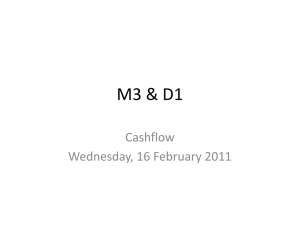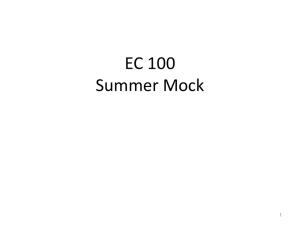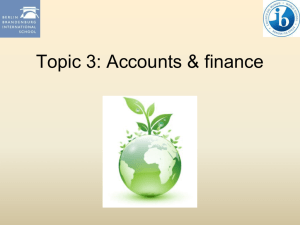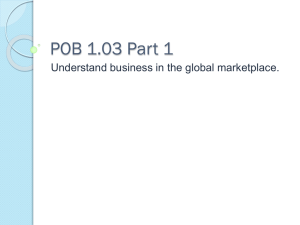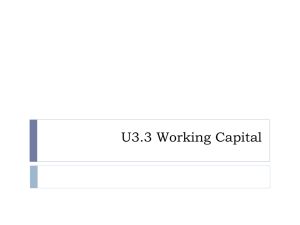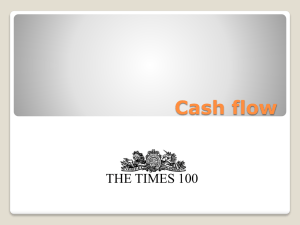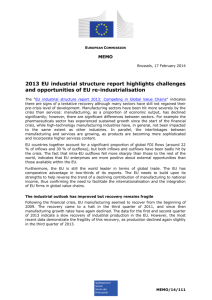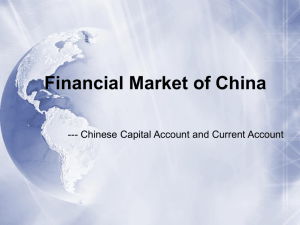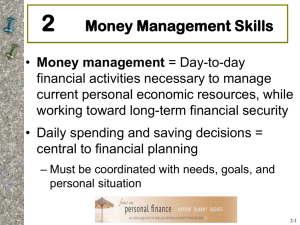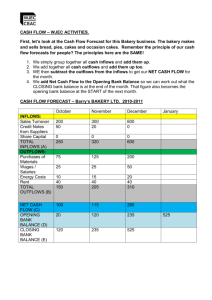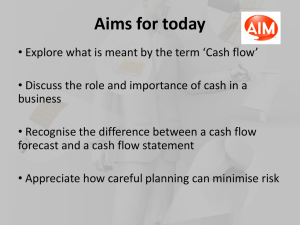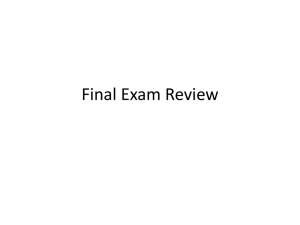Question 2
advertisement
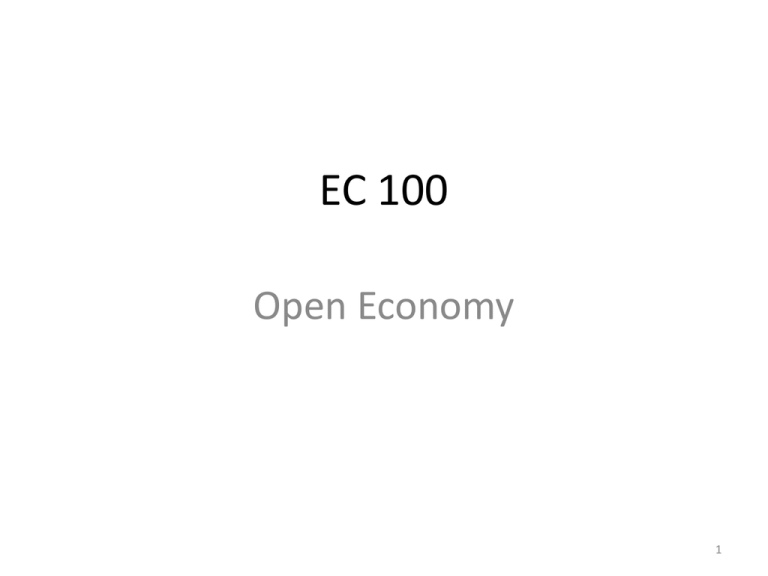
EC 100 Open Economy 1 Question 1 Define “exports” and “imports”. When do purchases by LSE students of LSE housing accommodation services constitute UK exports? 2 Question 1 • So basically, money earned abroad that is spent on British products is an export. • Even if it is spent in the UK! • Hence, if you spend money earned abroad on UK housing, it counts as an export. 3 Question 2 • When China’s economy runs a trade surplus, it also experiences net capital outflows. Describe how 4 Question 2 • Exports – imports = trade balance – UK and US have large trade deficits, i.e. exports<imports – So their trade balance is negative – China’s is positive 5 12 Trade balance, % of GDP % of GDP 10 USA UK 8 China 6 4 2 0 2005 2006 2007 2008 2009 2010 2011 2012 -2 -4 -6 -8 Source: World Bank World Development Indicators 6 Question 2 • So how do UK and US pay for this?! • Capital inflows – Capital outflows = Capital flows – Capital inflows are foreigners buying UK assets – Outflows are UK citizens buying foreign assets – So capital here means ownership of assets, not physical capital • Trade balance + capital flows = 0 (always!) – This = 0 because trade balance and capital flows always cancel each other out – If you have a trade deficit, capital inflows must be greater than capital outflows! 7 Question 2 • • • • So this is how UK and US pay for it! Foreigners are buying UK assets. We have net capital inflows. This enables us to pay for the excess imports we buy. 8 http://blogs.wsj.com/moneybeat/2014/03/10/britain-filling-a-hole-with-realestate/ Britons have a huge demand for foreign goods— on a broad measure the country imports far more than it exports. So where does the U.K. find the money to buy all this stuff? Increasingly, an examination of fund-flow data shows the answer is property. Foreigners snapping up U.K. real estate have become a vital source of cash. Simply put, the U.K. is selling Belgravia to buy BMWs and swapping Islington for iPods. 9 Question 2 • China is the “opposite” case • It is running a trade surplus – i.e. Exports>Imports – Instead of needing (net) capital inflows to finance excessive spending – like the UK and US do – it has excessive saving – It is consuming less than it is producing – It puts this “excess saving” abroad – Hence it has net capital outflows – (Note: these net capital outflows are what enable the UK and US to run trade deficits!). 10 Question 2 NCO and Exchange Rates Y= C + I + G + EX - IM Savings need not equal investment, as part of the savings may be invested elsewhere. The difference between savings and investment is called net capital outflow. This equals the country‘s trade balance! Some of China‘s savings are being invested in the UK and US 11 Question 3 • When China’s economy runs a trade surplus, it also experiences net capital outflows. What does the phrase "capital flowing uphill" mean? • Chinese Trade Surplus means positive capital outflows; the Chinese capital is flowing out of China to places with higher returns. • Phenomenon of global capital flowing “uphill” means capital is flowing from poorer to richer countries. • This is the opposite of what traditional economic theory predicts!! • One reason: China’s demand for assets cannot be met – in terms of both quantity and quality – in China, so they deploy part of their savings to countries like the US, which can offer a more diverse array of quality assets. • Alternative: specialization due to comparative advantage; developing countries specialize on labour intensive goods, while developed countries specialize in capital intensive goods. This implies that returns to capital in developed countries are higher than in less developed countries, explaining the observed capital flows. 12 Question 4 • The Real Exchange Rate takes into account the different price levels in countries. • This is sensible, e.g. suppose you are soon going to New York, and thinking of doing some shopping. • You would want to know: – The nominal exchange rate: so you can determine how many dollars you will have to spend. – The relative prices: so you can determine whether clothes are cheaper in New York or London. 13 Question 4 • Hence: • As UK price levels go up, the real exchange rate appreciates. • This implies UK goods become more expensive relative to other goods (you need more USD to purchase the same amount of UK goods and services). • This reduces export demand and increases import demand 14 Question 5 • What would a government seek to regulate the flow of goods and services across national borders? 15 Question 6 • See class. • In words: – – – – Increasing money supply shifts LM curve to right. This reduces r below “world equilibrium” level. Hence large capital outflows (NCO). This increases the supply of £, hence depreciates the currency. (Prices may increase, which offsets this effect on the RER, but assume this effect is smaller). – This increases net exports. IS curve shifts to right. – Hence, monetary policy highly effective under a flexible exchange rate. – Fiscal policy less effective than in closed economy. 16
